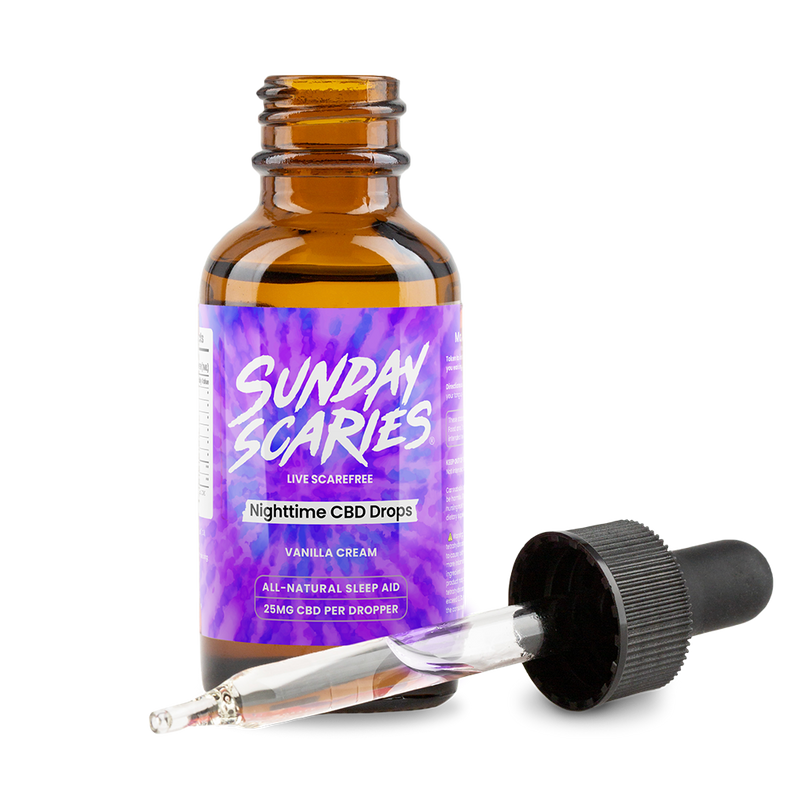
CBD vs. Melatonin for Sleep: Which is Better?
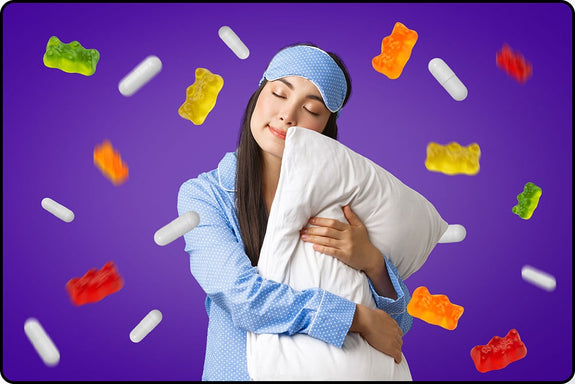
CBD is generally better for sleep if your issues stem from anxiety or pain, as it has calming and analgesic properties, while melatonin is more effective for regulating disrupted sleep-wake cycles. However, personal preference and individual response to these supplements can vary, so it may be worth trying both to see which works best for you.
In today’s fast-paced world, getting a good night's sleep has become increasingly challenging. With the constant barrage of information, stress, and lifestyle choices, many people struggle to find the rest they need.
As a result, sleep aids have become a popular solution for those looking to improve their sleep quality. Among the most talked-about options are CBD (cannabidiol) and melatonin.
But how do these two compare, and which one might be the best choice for you?
Let’s delve deep into the world of sleep aids and explore the benefits and drawbacks of CBD and melatonin.
Understanding Sleep and Its Importance
Before we dive into the specifics of CBD and melatonin, it's important to understand why sleep is so crucial.
Sleep is not just a period of rest; it is a vital process that affects every aspect of our health.
During sleep, the body undergoes numerous restorative processes, including muscle repair, memory consolidation, and hormone regulation.
Poor sleep can lead to a host of problems, including weakened immune function, increased stress, weight gain, and even chronic diseases like heart disease and diabetes.
What is CBD?
CBD, short for cannabidiol, is a compound derived from the cannabis plant. Unlike THC (tetrahydrocannabinol), another well-known compound from the same plant, CBD does not have psychoactive properties, meaning it does not produce a "high."
Over the past few years, CBD has gained popularity for its potential health benefits, including stress reduction, body ache relief and... drumroll please... improved sleep!
How CBD Works
CBD interacts with the endocannabinoid system (ECS) in the body, a complex network of receptors and neurotransmitters that play a role in regulating various physiological processes, including sleep, mood, appetite, and pain.
By influencing the ECS, CBD can help promote balance and homeostasis within the body.
CBD can be specifically useful when dealing with the setbacks from phenomenons known as: sunday scaries, sunday blues, post-concert depression, hangxiety, hangover depression, gymtimidation and more.
What is Melatonin?
Melatonin is a hormone naturally produced by the pineal gland in the brain. It plays a crucial role in regulating the sleep-wake cycle, also known as the circadian rhythm.
The production of melatonin is influenced by light exposure; levels typically rise in the evening as it gets darker, signaling to the body that it is time to sleep, and decrease in the morning with exposure to daylight.
How Melatonin Works
Melatonin supplements are designed to mimic the natural hormone, helping to regulate the sleep-wake cycle for those who have trouble falling asleep or staying asleep.
They are particularly useful for individuals with disrupted sleep schedules, such as nighttime shift workers (graveyard shifts) or those suffering from jet lag or sleep interruption from red-eyes.
CBD for Sleep: Benefits and Considerations
Benefits
1. Stress Reduction: One of the primary reasons people turn to CBD for sleep is its ability to reduce stress. Stress and anxiousness are major contributors to sleep problems, and CBD's calming effects can help ease the mind, making it easier to fall asleep and stay asleep.
2. Body Ache Relief: Chronic pain can significantly impact sleep quality. CBD has been shown to have potential anti-inflammatory and analgesic properties, making it a popular choice for those dealing with discomfort-related sleep issues.
3. Improved Sleep Quality: Some studies suggest that CBD may help improve overall sleep quality by increasing the amount of time spent in deep, restorative sleep. CBD doesn't just help induce sleep, but it promotes a more fluid and uninterrupted sleep experience.
Considerations
1. Dosage: Finding the right dosage of CBD can be tricky, as it varies from person to person. It may take some experimentation to determine the optimal dose for improving sleep. Starters usually being with 20-35mg of CBD (specifically for a remedy for sleep problems).
2. Side Effects: While CBD is generally considered safe, some people may experience side effects such as dry mouth, dizziness, or changes in appetite.
3. Interactions: CBD can interact with certain medications, particularly those metabolized by the liver's cytochrome P450 enzyme system, so it's important to consult with a healthcare provider before starting a CBD regimen, especially if you are taking other medications.
Melatonin for Sleep: Benefits and Considerations
Benefits
1. Regulates Sleep-Wake Cycle: Melatonin is particularly effective for individuals with disrupted sleep patterns, such as those experiencing jet lag or nighttime shift work. It helps reset the internal clock, promoting a more regular sleep schedule.
2. Non-Habit Forming: Melatonin is not addictive, making it a safer long-term option for those with chronic sleep issues compared to some prescription sleep medications.
3. Minimal Side Effects: Melatonin is generally well-tolerated, with few reported side effects. When they do occur, they are typically mild and may include dizziness, headaches, nausea and waking up feeling groggy or sluggish.
Considerations
1. Timing: The timing of melatonin supplementation is crucial for its effectiveness. Taking it at the wrong time can disrupt the sleep-wake cycle rather than improve it, and you obviously don't want to be drowsy while working or operating heavy machinery.
2. Not Suitable for Everyone: Melatonin may not be effective for everyone. Some people may not respond to melatonin supplements, especially those whose sleep issues are not related to circadian rhythm disruptions.
3. Long-Term Use: While melatonin is considered safe for short-term use, the long-term effects are not well studied. It's best used for occasional sleep issues rather than chronic insomnia. For chronic insomnia, we advise to chat with with a physician instead of trying to remedy your sleep with supplements.
Comparing CBD and Melatonin
Mechanism of Action
- CBD: Works by interacting with the endocannabinoid system, which regulates various physiological processes, including sleep.
- Melatonin: Mimics the natural hormone produced by the pineal gland to regulate the sleep-wake cycle.
Effectiveness
- CBD: Particularly effective for those whose sleep issues are related to stress or discomfort from pain. It may also improve overall sleep quality.
- Melatonin: Most effective for individuals with circadian rhythm disruptions, such as jet lag or shift work. Helps regulate sleep-wake cycles.
Side Effects
- CBD: Generally well-tolerated, but may cause dry mouth, dizziness, or changes in appetite in some individuals.
- Melatonin: Minimal side effects, typically mild and may include dizziness, headaches, or nausea. Many users always wake up feeling groggy or sluggish.
Long-Term Use
- CBD: More research is needed, but it is considered safe for long-term use. However, it's important to monitor for any potential side effects or interactions with other medications.
- Melatonin: Best used for short-term sleep issues. Long-term effects are not well studied, and it may not be suitable for chronic insomnia.
Which One is Right for You?
Choosing between CBD and melatonin ultimately depends on the underlying cause of your sleep issues and your individual response to these supplements.
-
If anxiety or pain is keeping you awake, CBD might be the better option. Its calming and analgesic properties may help potentially address the setbacks stemming from these issues, promoting better sleep.
-
If your sleep problems are related to a disrupted sleep-wake cycle, such as jet lag or shift work, melatonin may be more effective. It can help regulate your internal clock and improve sleep patterns.
When it all boils down, CBD is the better option because stress is the #1 cause of bad sleep and you don't wake up groggy from taking CBD like you do from melatonin.
Finally, it's also worth considering that some people may benefit from using both CBD and melatonin together.
For instance, taking melatonin to help regulate the sleep-wake cycle and CBD to reduce stress and improve sleep quality.
Can you Mix CBD with Melatonin?
Yes, you can mix CBD with melatonin to potentially enhance sleep quality, as they work through different mechanisms to promote restfulness.
CBD may help reduce stress and body discomfort stemming from pain, while melatonin helps regulate the sleep-wake cycle.
Combining these supplements can provide a synergistic effect, helping you fall asleep more easily and stay asleep longer.
However, it's important to start with low doses of each to monitor your body's response.
Be aware that melatonin can sometimes cause grogginess upon waking, so it's essential to adjust the dosage or timing if you experience this side effect. This is the main reason we do not incorporate melatonin in our CBD sleep oil here at Sunday Scaries.
Always consult with a healthcare provider before starting any new supplement regimen, especially if you are taking other medications or have underlying health conditions.
Practical Tips for Using CBD and Melatonin
CBD
1. Start Low and Go Slow: Begin with a low dose (20-35 mg) and gradually increase until you find the optimal amount for improving your sleep.
2. Consistency is Key: Take CBD consistently each night to allow it to build up in your system and maximize its effects. By consistently, we mean the same amount and at the same time before bed.
3. Choose Quality Products: Look for reputable brands that provide third-party lab testing to ensure the purity and potency of their CBD products.
Melatonin
1. Timing Matters: Take melatonin 30-60 minutes before bedtime to give it time to take effect.
2. Use for Short-Term: Melatonin is best used for occasional sleep issues rather than long-term treatment.
3. Monitor Effects: Pay attention to how your body responds and adjust the timing or dosage as needed.
What CBD Edibles are the Best for Sleep
The best CBD edibles for sleep are those that combine high-quality full spectrum CBD with other sleep-promoting ingredients such as vitamins, chamomile, or valerian root.
These edibles are designed to enhance relaxation and address issues like stress and body aches, which can interfere with sleep.
Look for products that are third-party tested to ensure purity and potency, and choose those with natural, sleep-supporting components to maximize their effectiveness.
Top 3 Best Edibles for Sleep
Lifestyle Changes to Improve Sleep
While CBD and melatonin can be helpful, making lifestyle changes can also significantly improve sleep quality.
Here are some tips:
1. Establish a Regular Sleep Schedule: Go to bed and wake up at the same time every day, even on weekends.
2. Create a Relaxing Bedtime Routine: Engage in calming activities before bed, such as reading, taking a warm bath, or practicing relaxation techniques.
3. Limit Screen Time: Avoid screens (phones, tablets, TVs) at least an hour before bed, as the blue light can disrupt melatonin production.
4. Create a Comfortable Sleep Environment: Ensure your bedroom is cool, dark, and quiet. Invest in a comfortable mattress and pillows.
5. Avoid Stimulants: Limit caffeine and nicotine intake, especially in the afternoon and evening.
Conclusion
Both CBD and melatonin offer potential benefits for improving sleep, but they work in different ways and are suited to different types of sleep issues.
In our opinion, CBD is better than melatonin for sleep, due to the lack of feeling groggy the next day and considering CBD takes stress head on, with stress being the #1 cause of bad sleep.
By understanding the underlying cause of your sleep problems and considering the unique properties of each supplement, you can make an informed decision about which one might be right for you.
Remember, it's always a good idea to consult with a healthcare provider before starting any new supplement regimen, especially if you have underlying health conditions or are taking other medications.
With the right approach and a bit of experimentation, you can find the solution that helps you achieve the restful, restorative sleep you need to thrive.
Frequently Asked Questions
Is THC or Melatonin better for sleep?
When comparing THC and melatonin for sleep, the best option depends on your specific needs.
THC, particularly in the form of THC gummies such as THC gummies for sleep, or Delta-9 gummies, can help promote sleep by reducing stress and muscle tension, making it easier to fall asleep and stay asleep.
However, it can also cause psychoactive effects, which some people may find undesirable.
Melatonin, on the other hand, is a natural hormone that regulates the sleep-wake cycle and is especially effective for those with disrupted sleep schedules.
While melatonin is non-psychoactive and generally well-tolerated, it may not be as effective for those whose sleep issues are rooted in stress or discomfort.
Ultimately, the choice between THC and melatonin will depend on your individual sleep challenges and preferences.

 CBD Gummies
Stress Relief
CBD Gummies
Stress Relief
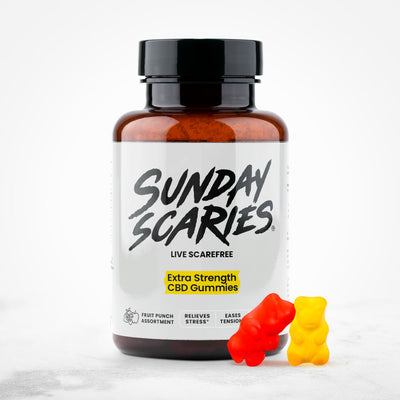 Extra Strength CBD Gummies
Stress Relief
Extra Strength CBD Gummies
Stress Relief
 Vegan CBD Gummies
Stress Relief
Vegan CBD Gummies
Stress Relief
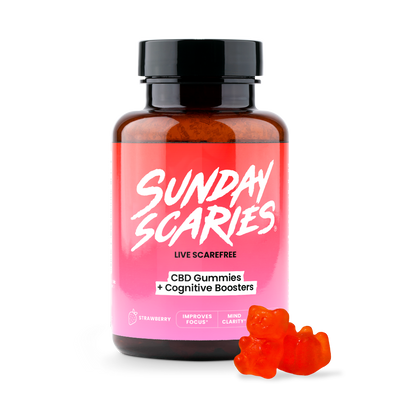 CBD Gummies for Focus
Focus Boost
CBD Gummies for Focus
Focus Boost
 CBD Candy
Mood Lift
CBD Candy
Mood Lift
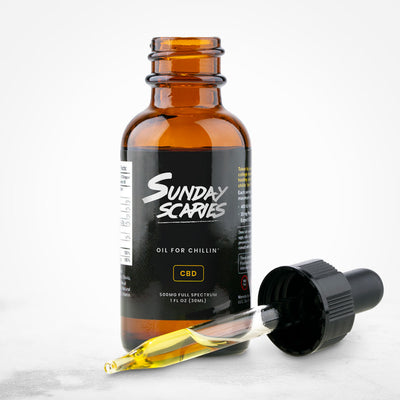 CBD Daytime Oil
Stress Relief
CBD Daytime Oil
Stress Relief
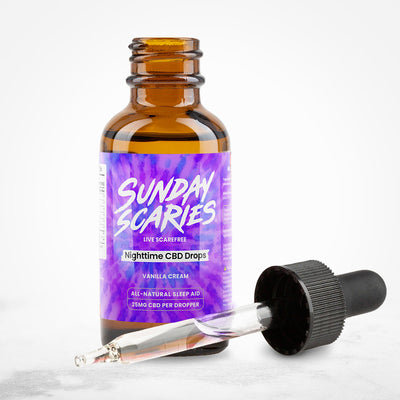 CBD Sleep Oil
Sleep Aid
CBD Sleep Oil
Sleep Aid
 CBD Dog Treats
Stress Relief
CBD Dog Treats
Stress Relief
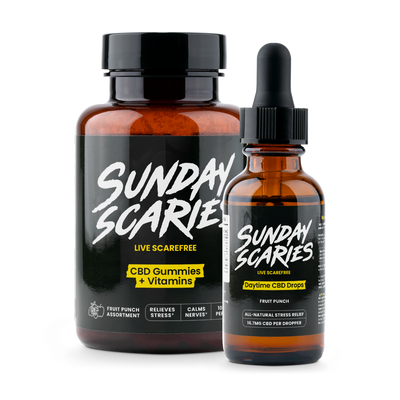 Side Piece Bundle
Stress Relief
Side Piece Bundle
Stress Relief
 Rando Bundle
Stress Relief
Rando Bundle
Stress Relief
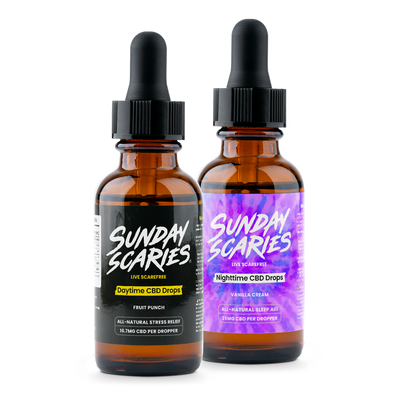 Sunrise & Sunset CBD Oil Bundle
Stress Relief
Sunrise & Sunset CBD Oil Bundle
Stress Relief
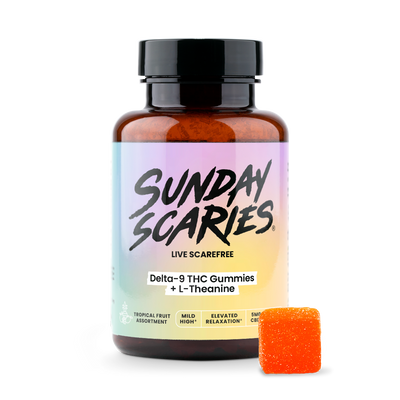 5mg Delta-9 Gummies
Euphoria
5mg Delta-9 Gummies
Euphoria
 10mg Delta-9 Gummies
Euphoria
10mg Delta-9 Gummies
Euphoria
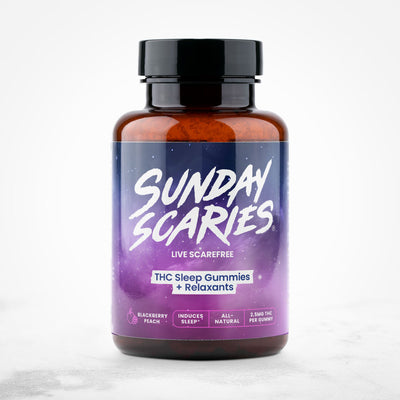 THC Gummies for Sleep
Sleep Aid
THC Gummies for Sleep
Sleep Aid
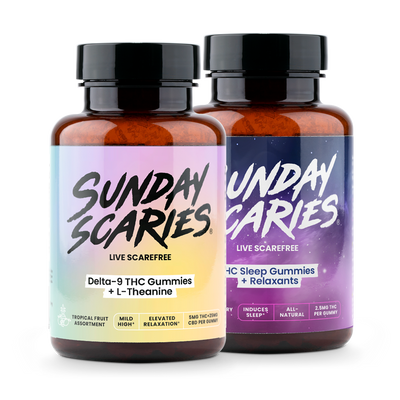 Day & Night THC Gummies Bundle
Stress Relief
Day & Night THC Gummies Bundle
Stress Relief
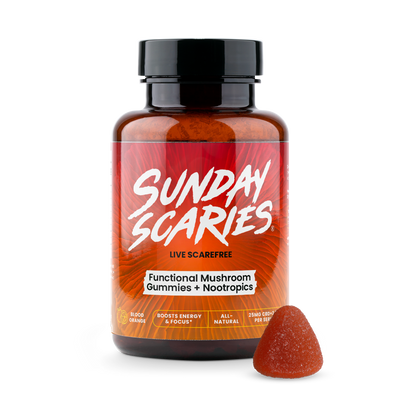 Mushroom Gummies
Focus Boost
Mushroom Gummies
Focus Boost
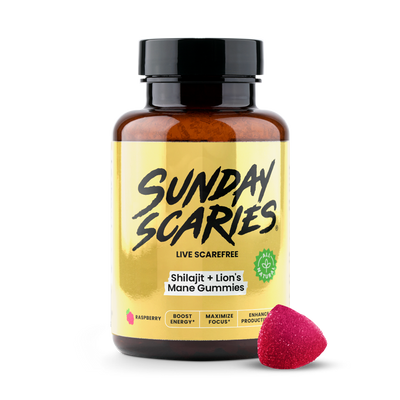 Shilajit Gummies
Focus Boost
Shilajit Gummies
Focus Boost
 Sunday Scaries Hat
Sunday Scaries Hat
 Sunday Scaries Dad Hat
Sunday Scaries Dad Hat
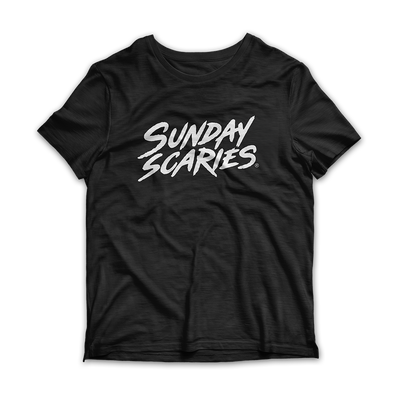 Sunday Scaries T-Shirt
Sunday Scaries T-Shirt
 Sunday Scaries Pocket Tee
Sunday Scaries Pocket Tee
 Sunday Scaries Tank Top
Sunday Scaries Tank Top
 Sunday Scaries Sweatshirt
Sunday Scaries Sweatshirt
 Sunday Scaries Blanket Jacket
Sunday Scaries Blanket Jacket
 Sunday Scaries Sweatpants
Sunday Scaries Sweatpants

